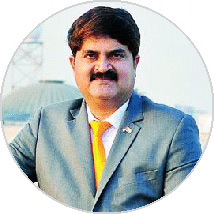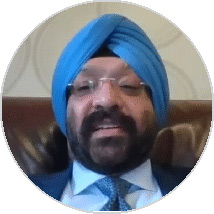All CEO Colloquium was one-of-its kind also a part of the Global Virtual Healthcare Expo 2020 held from Nov 23-26, 2020. The colloquium which included industry stalwarts received overwhelming response. The following is the gist of the proceedings.

Mahendra Mehta,
President IPMMA
Mahendra Mehta, President IPMMA warmly welcomed all the panelists of the CEO Colloquium. He took off his address on a positive note as the world is bravely facing the pandemic, getting used to the face-mask and Sanitizer lifestyle, and not to miss the Indian spirit of converting crisis into opportunity. He wished to have a learning experience from the thought leaders of Pharma Industry during the interaction.

AVPS Chakravarthi,
Global Ambassador – World Packaging Organization (WPO)
Mr. Chakravarthi moderator for the colloquium, extended the welcome note to all the esteemed leader on panel throwing some light on the steadfast attitude of the industry in combating this pandemic. “I always feel proud being a stakeholder of this industry which is life-saving and life-sustaining”, he added.

Yugal Sikri,
MD – RPG Life sciences
Mr. Sikri presented a holistic view on the Pharma packaging industry categorizing it into back-end and the front-end. The back-end deals with the product development, packaging, manufacturing, regulating etc. and front-end deals with Sales and Marketing. The end user, the patient is now much knowledgeable, literate and it’s the time to take a ‘Patient Centric’ approach. The patient has many questions unanswered owing to shortage of time with doctors and physicians, here is where packaging could play a major role. Even the counterfeiting industry could be tackled with effective packaging.

Milan Patel, Joint MD,
Troikaa Pharmaceuticals Ltd
For drug delivery, we need to be aware of the classification of the formulation designed on the basis of its solubility and permeability. Pharmaceutical industries need to design their formulation based on this classification for optimal delivery of the product based on the right principles.
From the end-user’s perspective, we received feedback from some doctors that almost all companies are imitating the big players for the drug delivery vertical. For a certain drug the doctors shared that it cannot be given in the deltoid muscles of the arm, it has to be compulsorily given in the gluteal muscle of the hip which is not comfortable for both gender as well as more painful comparatively. Then we developed first in the world Diclofenac spray. Some of the smart Indian companies have realized the saturated generic drugs market and have shifted to hard-to-deliver drug delivery. If the pharma machine manufacturers understand the intricacies and the design requirements of the drug delivery, the drug delivery system will become smooth.

Dr. Sanjit Singh Lamba,
CEO – Biocuris Inc.
While highlighting the role of Pharma Processing and Engineering Dr. Lamba shared that our ability to produce good quality, cost effective product largely depends on what kind of core quality equipment we have deployed for manufacturing the product. A continuous improvement in these last two decades have been seen with respect to the automation in the industry.
Visibility of the key control variables in the designing of processes itself is vital. High quality product doesn’t come with just high equipment, people or raw material, but we need to set up the quality variables in the system for better control. And the real challenge is to define those variables in the system. Hence last 15 years of my experience tells ‘Design by Quality’ approach is inevitable for a quality product.
A manufacturing management professional needs a clear visibility and a dashboard with a runtime eye on the process, which could be achieved by sensors capturing all data runtime. This could give a good guide for selection of the machine, the one which gives the control over the variables and in turn producing the high-quality product.

Dr. Satakarni Makkapati, President Aurobindo Pharma Ltd.
Key aspects of primary packaging science especially in life saving biologicals are:
Thorough understanding of the packaging scientist and those who develop the formulations with full understanding of the extractables.
Identification and availability of assessment of toxicological profile of each of these extractables.
Control of visible and sub-visible particles.
Dr. Makkapati emphasized on the importance of development of biologicals which is going to be the future.

Dr. Pirthi Pal Singh, Head-Formulation Research and Development,
Dr. Reddy’s Laboratories Ltd.
In the second quarter of this calendar year, most of the business had challenge with Logistics and mainly to the countries which are dependent for import and export of raw materials. Although India is among the top producers of generic drugs, during this post complete lockdown duration many opportunities emerged in repurposing of the existing drugs. It’s time for us to move from generics to differentiated product development.
Adopting drug delivery technologies like personalized medicines, 3D printing and more as a part of complete digitization can help us in sustaining the growth of the pharmaceutical industry. Devices, vials or the container which can reduce or optimize the fill volume are the non-sticky containers aptly used for packaging which curtails the drug wastage to a great extent. This could not only prove economical for the industry but the end consumer as well.

Shehul Sheth,
Vice President, IPMMA
IPMMA with its journey of two decades have been serving the pharma industry relentlessly and I am delighted to share that many of the members have either their base or a Joint venture in Europe. Our equipment is now accepted in 90+ countries including US and Europe markets. Tooling also has developed in the recent years and it has a sizeable impact in cost-saving initiatives. In pharmaceutical companies, the key aspects are operational efficiency and patient safety. The automation plays a vital role. Post-COVID considering secondary and tertiary packaging, the line balancing should be efficiently executed by choosing the right packaging machine.
On collaboration in the pharma machinery industry, Mahendra Mehta added “Indian pharma industry have been evolving right from 1960’s which primarily were the just the support system. Initially, the industries were focusing on functional support, ensuring that their plants were up and running . Down the line, the industry focus shifted on aspects like automation, aesthetics and validation. In order to step up on these aspects, Indian companies started moving towards European countries and started collaborating with companies overseas.
Mr. Chakravarthi while concluding thanked the panelists for their views on the insightful and focused Colloquium.
IPMMA appreciates support of Mr. Chakravarthi for conceptualizing the ‘All CEO Colloquium’ and in identifying Industry captains for the highly interactive panel discussion and made it much knowledge sharing with his unique style of moderating.


Leave a Reply
You must be logged in to post a comment.